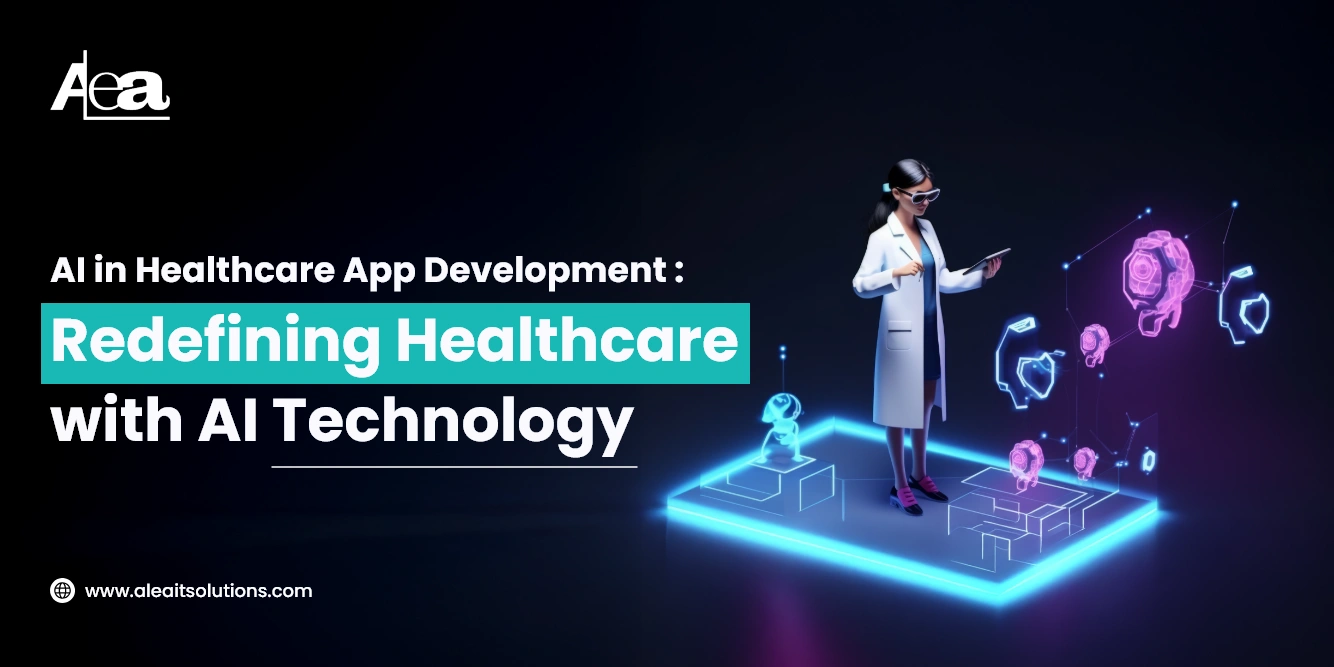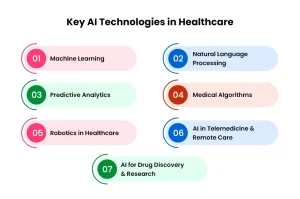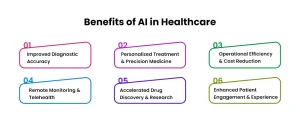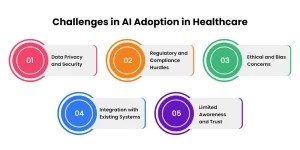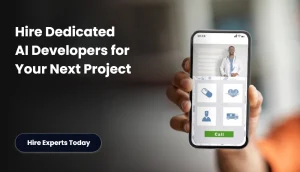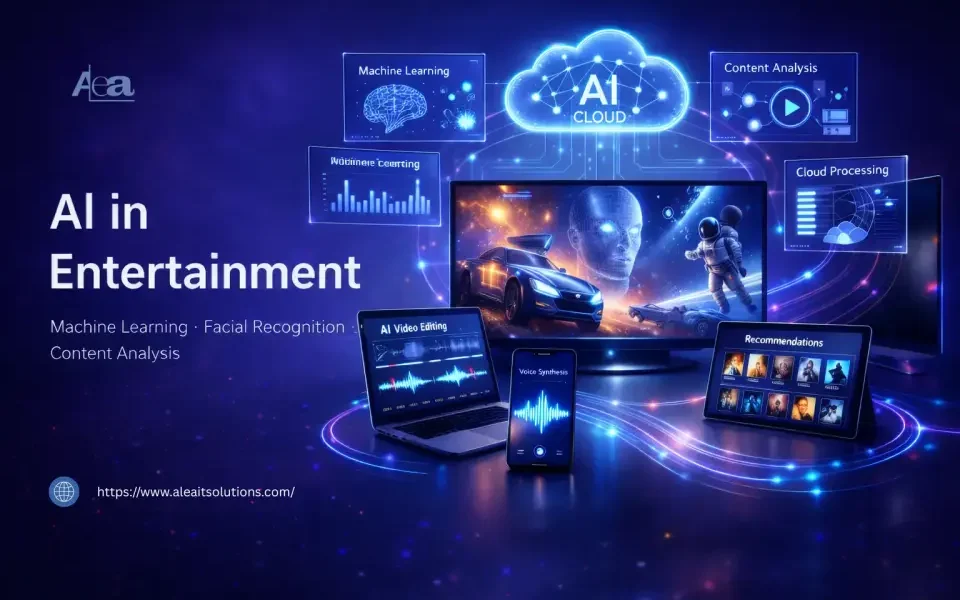Artificial Intelligence (AI) is revolutionizing healthcare ai app development by enabling smarter, faster, and more personalized patient care.
AI-powered apps leverage machine learning to analyze medical images, lab results, and patient histories, detecting subtle patterns that may be missed by humans and enabling early, accurate diagnoses.
They also streamline administrative workflows such as appointment scheduling, billing, and record-keeping, reducing errors and freeing healthcare providers to focus on patients.
With predictive analytics and Natural Language Processing (NLP), these apps can anticipate patient needs, provide personalized treatment suggestions, optimize resource allocation, and extract insights from unstructured medical records.
Beyond patient care, ai healthcare apps support research, drug discovery, and clinical studies by processing massive datasets and generating actionable insights.
By integrating AI into healthcare applications, ai developers are creating a more efficient, proactive, and patient-centered ecosystem that enhances outcomes, improves operational efficiency, and drives innovation across the medical field.
Overview of AI in Healthcare
AI applications in healthcare is transforming healthcare app development by enabling smarter, faster, and more personalized patient care.
Machine learning (ML) algorithms integrated into healthcare apps can analyze vast amounts of medical data to detect early signs of diseases such as cancer, cardiovascular conditions, and neurological disorders, allowing clinicians to intervene sooner and improve outcomes.
Natural Language Processing (NLP) within AI healthcare apps extracts meaningful insights from unstructured data like electronic health records, physician notes, and lab reports, providing accurate and actionable information instantly.
Predictive analytics further enhances AI applications in healthcare by identifying potential health risks before they escalate, helping hospitals and healthcare providers optimize resources and prioritize care.
AI-driven features also support personalized medicine by tailoring treatment plans to an individual’s medical history, genetics, and lifestyle.
By combining these technologies, AI-powered healthcare apps are creating a more proactive, efficient, and patient-centered healthcare ecosystem.
Key Stats of the Global Artificial Intelligence in Healthcare Market
The impact of AI in healthcare is both impressive and measurable:
- The global AI healthcare market is projected to reach $240 billion by 2030, growing at a CAGR of over 40%.
- Over 40% of healthcare organizations have already adopted AI solutions in some capacity.
- AI-powered diagnostics can improve detection accuracy by up to 95% for certain conditions, significantly reducing misdiagnoses.
- Administrative applications of AI, such as automated patient scheduling and billing, can save hospitals up to 20% in operational costs annually.
These figures demonstrate that AI in Healthcare is not just an innovation it is a necessity for improving outcomes, reducing costs, and shaping the future of medicine.
Key Technology of AI Healthcare App Development
1. Machine Learning (ML)
Machine learning enables systems to learn from historical data and improve over time. In healthcare, ML is used for:
- Predicting patient outcomes and disease progression.
- Identifying high-risk patients for early interventions.
- Enhancing diagnostic imaging, such as detecting tumors in radiology scans.
By analyzing vast datasets, ML supports clinicians in making more accurate and timely decisions.
2. Natural Language Processing (NLP)
NLP allows computers to understand and interpret human language. In healthcare, it is applied to:
- Extract critical information from electronic health records (EHRs).
- Automate clinical documentation and patient notes.
- Monitor social media and public health data for emerging health trends.
NLP reduces administrative burden while improving the accuracy of patient information processing.
3. Predictive Analytics
Predictive analytics uses historical and real-time data to forecast outcomes. Key applications include:
- Early detection of chronic conditions such as diabetes or heart disease.
- Predicting hospital readmissions and preventing complications.
- Resource optimization in hospitals, including staffing and equipment allocation.
This proactive approach helps reduce costs and improves patient care quality.
4. Medical Algorithms
AI-driven medical algorithms can analyze complex datasets and provide evidence-based recommendations. Examples include:
- Personalized treatment plans for cancer or rare diseases.
- Risk scoring for cardiovascular events.
- Optimization of surgical procedures using patient-specific data.
Algorithms complement the expertise of healthcare professionals, ensuring precision and safety.
5. Robotics in Healthcare
Robotics, powered by AI, is transforming surgery, rehabilitation, and patient care:
- AI-assisted surgical robots enable minimally invasive procedures with higher precision.
- Robotic exoskeletons support patient mobility and rehabilitation.
- Automated hospital robots manage logistics, sanitation, and medicine delivery.
These innovations enhance efficiency while reducing human error.
6. AI in Telemedicine & Remote Care
Artificial Intelligence is a cornerstone of telemedicine, enabling remote monitoring and virtual consultations:
- Intelligent chatbots provide initial patient triage and health guidance.
- Remote patient monitoring devices analyze vital signs and alert clinicians in real-time.
- Virtual assistants help manage chronic diseases from home, improving accessibility and adherence.
AI makes quality healthcare accessible even in underserved regions.
Read Also: How Much Does Mobile App Development Cost?
Key Applications of AI in Healthcare
| AI Application | Description |
|---|---|
| 1. AI in Clinical Documentation | AI-driven NLP models convert physician notes into structured medical records, improving accuracy and compliance with HL7 and FHIR standards. |
| 2. Predictive Analytics for Patient Outcomes | Machine learning models predict hospital readmissions, mortality, and disease progression, enabling proactive care interventions. |
| 3. Disease Outbreak Prediction | AI processes epidemiological data to forecast disease outbreaks, supporting early public health decisions. |
| 4. Precision Medicine and Genomics | AI analyzes genomic data to identify biomarkers and recommend personalized treatments based on genetics. |
| 5. AI-Driven Drug Discovery | Generative models and simulation tools accelerate drug discovery, reducing development timelines. |
| 6. Clinical Trial Optimization | AI predicts trial eligibility, identifies candidates, and forecasts outcomes, improving trial success rates. |
| 7. Diagnostic Imaging and Computer Vision | Deep learning models assist in detecting tumors and abnormalities in CT, MRI, and X-ray scans. |
| 8. Robotic Surgery and Assistive Automation | AI-guided robots enable minimally invasive surgeries, improving precision and recovery. |
| 9. Remote Patient Monitoring and IoT | AI analyzes real-time data from wearables and IoT devices, alerting for early intervention in chronic disease management. |
| 10. AI-Powered Virtual Assistants | Conversational AI offers 24/7 patient interaction, performs symptom triage, and schedules appointments. |
| 11. AI in Digital Therapeutics | AI-driven digital therapy adapts in real-time based on patient behavior and treatment response. |
| 12. Hospital Operations and Workflow Automation | AI optimizes resource allocation, staffing, and bed management, boosting hospital efficiency. |
| 13. AI in Pharmacy and Supply Chain Management | AI forecasts medication needs, prevents stockouts, and ensures accurate dispensing in pharmacies. |
Benefits of AI in Healthcare
1. Improved Diagnostic Accuracy
AI algorithms can analyze imaging, pathology slides, and lab results with high precision. For instance:
- AI-assisted radiology can detect early-stage cancers with up to 95% accuracy, often outperforming human radiologists in spotting subtle patterns.
- Pathology AI tools help identify rare conditions that could otherwise be missed.
This ensures faster, more accurate diagnoses, reducing human error and improving patient outcomes.
2. Personalized Treatment & Precision Medicine
AI enables treatment plans tailored to individual patients by analyzing genetics, lifestyle, and medical history. Benefits include:
- Optimized drug dosages for better efficacy.
- Selection of targeted therapies for cancer or chronic diseases.
- Predicting patient response to treatments, minimizing trial-and-error approaches.
Personalized care leads to improved recovery rates and better quality of life.
3. Operational Efficiency & Cost Reduction
AI streamlines hospital operations and administrative tasks:
- Automated scheduling and patient flow management reduce wait times.
- Predictive maintenance of medical equipment ensures uninterrupted services.
- AI-driven billing and documentation cut administrative overheads by up to 20%.
Hospitals can allocate resources more effectively, lowering operational costs.
4. Remote Monitoring & Telehealth
AI-powered wearable devices and telemedicine platforms allow continuous health monitoring:
- Real-time alerts for critical events such as heart irregularities or diabetic complications.
- AI chatbots provide 24/7 patient support and initial symptom assessment.
- Enhanced chronic disease management reduces hospital visits and readmissions.
This expands access to quality care, especially in remote or underserved regions.
5. Accelerated Drug Discovery & Research
AI dramatically shortens the time from lab research to market-ready drugs:
- Machine learning predicts promising drug candidates faster than traditional methods.
- Simulation of clinical trials identifies potential side effects early.
- Data-driven research fosters innovation in rare and complex diseases.
Patients benefit from faster availability of life-saving medications.
6. Enhanced Patient Engagement & Experience
AI technology in healthcare the overall patient experience:
- Virtual assistants guide patients through care pathways, reminders, and follow-ups.
- AI-driven tools provide health education tailored to individual needs.
- Efficient service delivery reduces stress and enhances patient satisfaction.
Read Also: AI development companies in USA
Challenges in AI Adoption in Healthcare
1. Data Privacy and Security
AI relies heavily on patient data, making cybersecurity a top concern. Protecting sensitive medical information from breaches and misuse is essential to maintain trust and comply with regulations like HIPAA and GDPR.
2. Regulatory and Compliance Hurdles
Healthcare is a highly regulated sector, and integrating AI tools requires approval from health authorities. Ensuring transparency, accountability, and compliance with evolving AI regulations remains a significant challenge.
3. Ethical and Bias Concerns
AI models can reflect biases present in the data they are trained on, leading to unequal or inaccurate outcomes. Ethical AI deployment requires diverse datasets and transparent algorithm design to prevent disparities in care.
4. Integration with Existing Systems
Many healthcare institutions still rely on legacy software and paper-based processes. Integrating AI solutions into these environments requires investment, training, and system upgrades.
5. Limited Awareness and Trust
Clinicians may hesitate to rely on AI recommendations without clear understanding of how algorithms reach conclusions. Building confidence through explainable AI and user education is vital for adoption.
Future Trends of AI in Healthcare
The next wave of AI-driven healthcare is poised to be even more transformative, blending intelligent systems with advanced technologies to create a connected, predictive, and personalized care ecosystem.
Alea IT Solutions can drive this transformation by delivering end-to-end healthcare development solutions that integrate AI-powered diagnostic tools, telemedicine platforms, and personalized treatment planning.
Their expertise enables the creation of smart electronic health records, predictive analytics for patient care, and IoT-enabled wearable integration for real-time monitoring, ensuring seamless, secure, and patient-centric healthcare experiences.
By combining deep healthcare domain knowledge with cutting-edge technology, Alea IT Solutions empowers hospitals, clinics, and healthcare startups to offer faster, smarter, and more efficient care for every patient.
Emerging Integrations
- AI and Wearables: Smart devices powered by AI will continuously monitor vital signs, detect abnormalities, and alert physicians in real-time, making preventive care a daily reality.
- Genomics and Personalized Health: AI will decode genetic information to predict disease risks and design individualized treatment plans tailored to a person’s DNA and lifestyle.
- Generative AI for Research: Advanced generative models will accelerate medical research, simulate clinical scenarios, and assist in drug discovery with unprecedented speed.
- AI-Assisted Diagnostics: Diagnostic tools will evolve to integrate imaging, lab reports, and genetic data into unified insights, empowering doctors with holistic decision support.
How Alea Can Drive AI Innovation in Healthcare APP Development
Alea, a leading ai development company, is at the forefront of delivering AI-driven solutions that are transforming healthcare into a more efficient, accurate, and patient-centric ecosystem.
By combining deep technical expertise with a strong understanding of medical workflows, Alea helps healthcare providers harness the full potential of Artificial Intelligence.
From diagnostics to predictive care, Alea’s cutting-edge AI technology in healthcare enables hospitals and clinics to analyze massive datasets in real time and make data-backed clinical decisions.
Machine learning algorithms detect early signs of diseases, natural language processing (NLP) extracts critical insights from unstructured medical records, and predictive analytics helps anticipate patient risks before they escalate.
These technologies empower clinicians to make faster, more informed decisions, improving patient outcomes and operational efficiency. Alea also supports the development of AI-powered tools for telemedicine, remote monitoring, and personalized treatment plans.
By integrating medical algorithms and automation into healthcare systems, Alea reduces administrative workload, optimizes resource allocation, and accelerates drug discovery and research.
With a commitment to ethical AI, regulatory compliance, and seamless integration, Alea enables healthcare organizations to adopt AI responsibly while driving innovation, cost savings, and better patient care.
Conclusion: The Human-AI Partnership in Healthcare
AI technology in healthcare is redefining the future of medicine not as a replacement for human intelligence, but as its most powerful ally. From early diagnosis and precision treatment to remote care and medical innovation, AI is enabling healthcare that is faster, smarter, and more humane.
As the industry continues to evolve, collaboration will be the cornerstone of progress. Clinicians, researchers, data scientists, and policymakers must work hand-in-hand to ensure AI remains ethical, transparent, and inclusive. The goal is not to create a machine-led system, but a human-centered, AI-empowered healthcare ecosystem.
The future of healthcare lies in the perfect balance between human compassion and machine precision. Together, they promise a world where diseases are detected earlier, treatments are more effective, and every life receives care that’s truly personalized.

